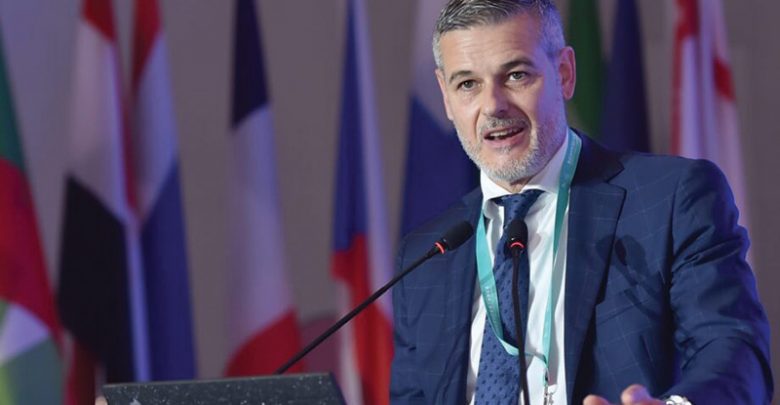


Mauro Mamoli, President, Federmobili
Furniture distribution in Italy presents a unique scenario. According to Mauro Mamoli, president of Federmobili, the association of independent distributors, it is made up of two distinct categories: Large Organized Distribution (also known as GDO), which are sizeable sales areas with centralized purchases and sales chains such as IKEA and the “Mondo Convenienza” and “Gran Casa” groups among others, as well as the independent shops, usually managed by entrepreneurs, whose families have been in the business for generations.
The market shares are 30 percent held by GDO distribution, 60 percent by traditional distribution and the remainder divided between small artisans and e-commerce traders, according to Mamoli. Traditional Italian furniture shops have an average area of about 1,000 square meters and usually employ around five people. A large concentration of such operations is located in the norwestern region of Italy and, generally, found outside the urban centers. In recent years, the market has been heavily affected by the country’s economic crisis, with no significant growth recorded. The arrival of last year’s pandemic saw an average reduction in turnover of -12/15 percent.
Federmobili, which Mamoli heads, has been active since 1967 and consists of about 15,000 distribution companies and about 17,000 stores, since some companies have more than one point-of-sale. It is a member of Confcommercio, the largest Italian organization of trade and tourism professionals, with about 250 direct members and another 4,500 associated with the local Confcommercio units. Federmobili is in direct contact with most of the stores, communicating with them through e-mails, social network platforms such as Facebook, Instagram, Twitter and LinkedIn and a regular online magazine. It also promotes the members’ marketing activities, promotions and organizes training courses with specific topics on business development and cost updating.
Commenting on the distribution system of Federmobili’s members, Mamoli says: “The size of the stores is not large and the procurement system is managed by them as well. In addition to the goods that make up the display, orders are handled directly according to the customer’s individual order as it is difficult to set up a warehouse of ready-made goods.
“The work of retailers is based heavily on the design and customisation of spaces and furnishings, and custom-made products make up many of the orders. For these shops, there is no purchasing center. Each entrepreneur has different purchasing needs and individual agreements with supplier companies.”
Of Federmobili’s many activities, interaction with the Italian government and its various ministries is one of its significant functions. “We coordinate with Confcommercio, and many times make joint requests together with the association of Italian furniture manufacturers [Federlegno Arredo]. During this period of the pandemic, we have worked hard to obtain economic incentives from the government to help companies, forced to temporarily close their operations due to the spread of the virus infection in order to overcome the strong crisis in sales and decline in turnover.”
He adds: “To boost the stores’ business, we make general agreements that can facilitate access to special services. For example, we have agreements with companies that supply 3D design programs, with software suppliers for the economic management of the store and with financial companies that allow us to offer the customer payment in installments. Other provide discounts on the purchase of vehicles for business and commercial transport.

“Our Federation contacts possible suppliers of these products and services. We make sure that the conditions of our agreements are better than other offers on the market and then, through our newsletters, social network platforms and our site, we promote adherence to these agreements. Many times, we are contacted directly by companies, offering us services that could be of interest to our associates. Together with the members of the Federation’s board, we assess if such proposals are actually useful and beneficial.”
Education remains a continuing mission for Federmobili, more so in these challenging times. Says Mamoli: “For us, training, updating and timely information are essential, and since 1998, we have been facilitating specialised courses in store management. We have agreements with the universities of Management Economics, Architecture and Design of Milan and Rome related to these and, in some cases, we have proposals for future scenarios regarding furniture distribution in Italy.”

Subjects of these workshops include the design and set-up of showrooms, economic management of the point-of-sale, effective product mix, relationship with the supplier, training of the assembly staff and after-sales assistance among others. Says Mamoli: “We draw up a six-month course plan, featuring the topics that we want to propose to our associates. Then, we prepare a calendar of meetings and proceed with the invitation to register, which is about fifteen days before the fixed date. We use email and social network platforms to disseminate information the store owners about the courses.”
In addition, Federmobili would host two annual conferences, as well as the Independent Distribution Convention, the last face-to-face event, having been in October 2019. With the recent health crisis, training has been forced to go online, using the popular webinar formula.
Federmobili has not limited its activities to the Italian market alone. Before the pandemic struck, it encouraged members to join trade fairs overseas, organising small delegations, to exhibitions in Malaysia, Singapore, China, Poland and Serbia.
These should resume once the global health situation settles – that Mamoli is optimistic about. Meanwhile, Federmobili will continue to work for its members’ best interest, as it has always done these past 54 years.

